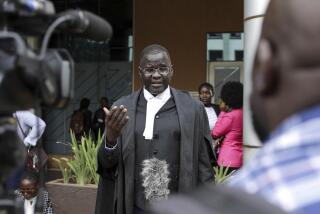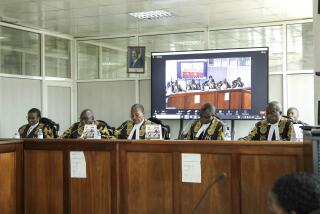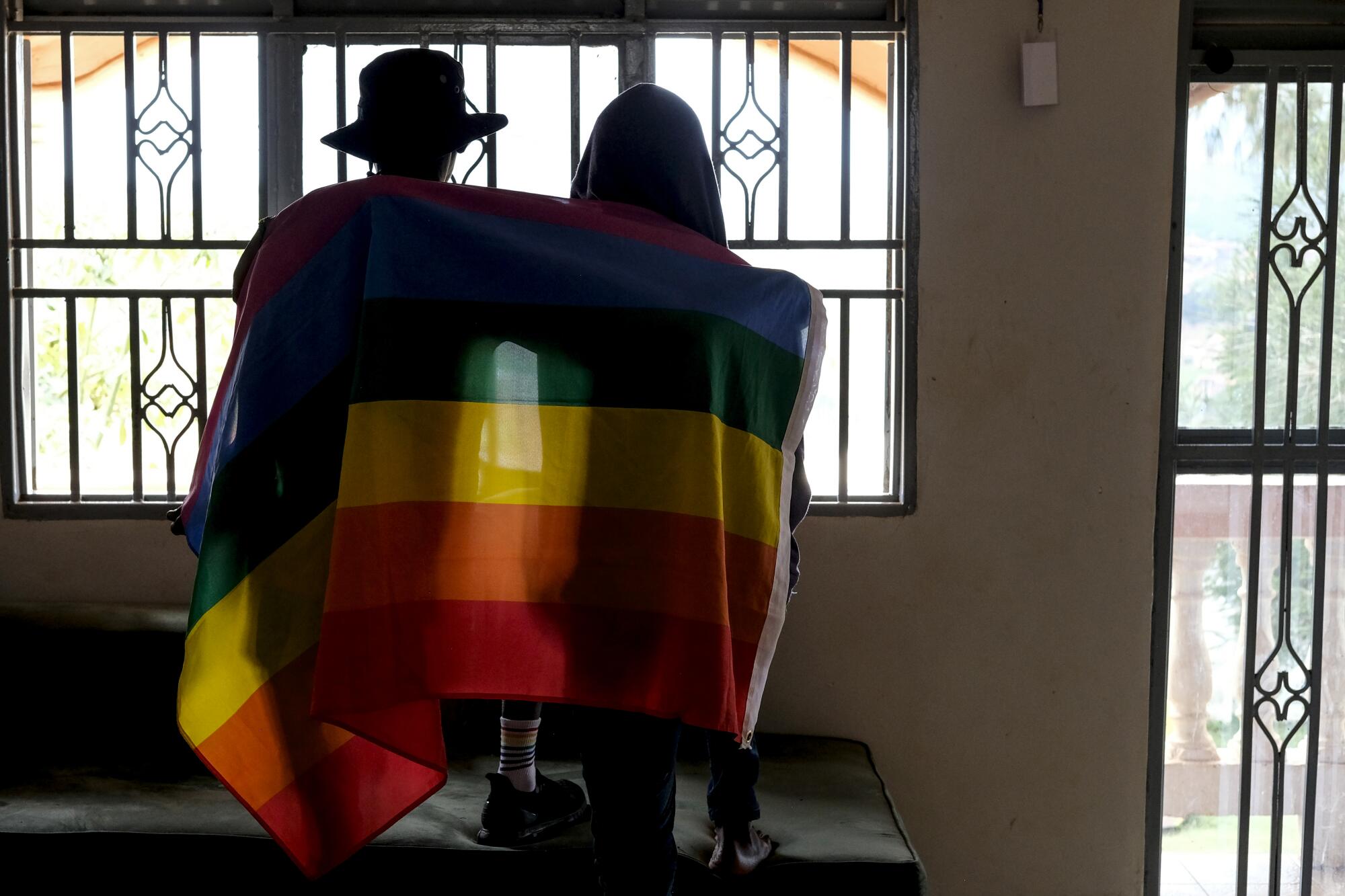
KAMPALA, Uganda — He was in high school when he realized he was gay.
His parents, he says, have long wondered, and, lately, he’s been thinking about how to tell them.
“I believe they would receive that information well,” the customer service representative said with a smile.
But that may not happen now, because of legislation approved last month by Uganda’s parliament.
The 2023 Anti-Homosexuality Bill, passed on a 387-2 vote, would impose some of the world’s strictest anti-gay measures — with punishments that include the death penalty — if it is signed into law by President Yoweri Museveni.
An admission of being gay could result in a lengthy prison sentence, leaving many in this country’s small but tightly knit gay community living in terror and considering fleeing. The law also criminalizes the failure to report people suspected of participating in gay sexual activity, putting friends, former partners — even supportive parents — at risk of going to jail for remaining silent.
“There is a lot of fear,” the 28-year-old service rep said. “I have been looking for progressive communities where I can go and be myself. I love my country so much, [but] our government keeps shocking us.”
In addition to calling for the death penalty for “aggravated homosexuality” — defined as sexual relations with someone younger than 14 or older than 75 — the legislation confirms an existing punishment of life in prison for gay sexual activity and bans the “promotion of homosexuality.” Anyone who advocates for LGBTQ people or provides support for organizations that do so could face as much as two decades in jail.
Even tourists would be subject to imprisonment and fines if they engage in any prohibited behavior.
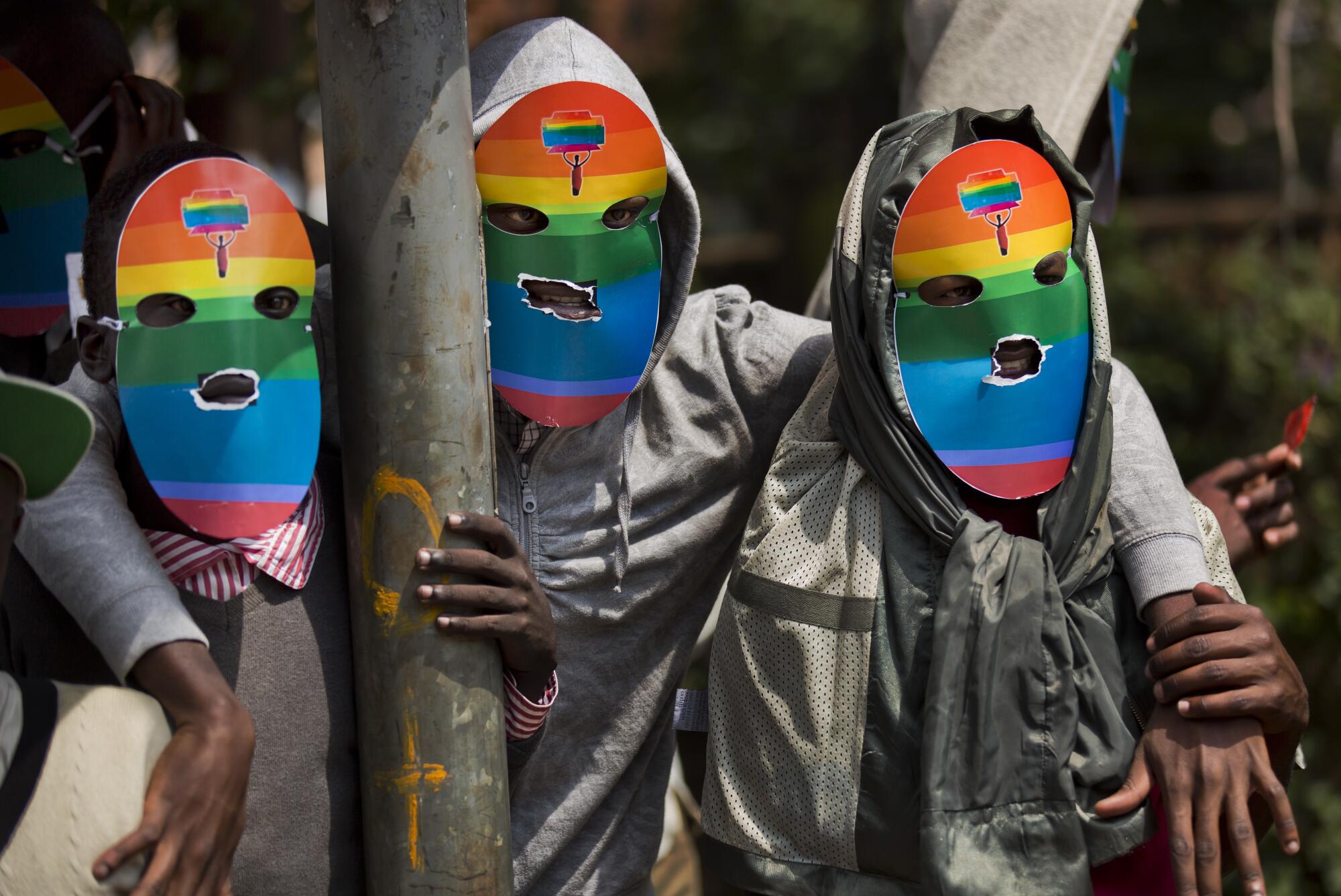
Museveni, a former military officer who has ruled Uganda for more than 37 years, has until late this month to sign the bill into law, veto it or send it back to parliament for revision. Many observers expect him to choose the third option and ask lawmakers to tone down some of the harsher parts of the legislation, which has drawn heavy criticism from world leaders including Volker Turk, the United Nations high commissioner for human rights, and U.S. Secretary of State Antony J. Blinken.
Jessica Stern, the U.S. State Department’s special envoy to advance the human rights of LGBTQI+ people, calls the bill, also known as the Anti-Homosexuality Act, “cruel and extreme.”
“Community members tell me that home evictions and community violence against LGBTQI+ people have already increased with the bill’s passage by parliament,” Stern said. “If the AHA is signed into law, it will jeopardize progress in the fight against HIV/AIDS, deter investment in Uganda, threaten the human rights of all Ugandan citizens, and damage Uganda’s international reputation.”
The U.S. government invests almost $1 billion annually in Uganda.
::
Lawmakers who supported the bill said it was needed to protect “family values.” After it passed, they stood on the floor of the parliament and cheered, and then sang the national anthem.
“These acts include promotion of homosexuality and the recruitment of children into homosexuality, which have been blamed for the rising incidents of homosexuality in Uganda,” said Robina Rwakoojo, chair of parliament’s legal and parliamentary affairs committee and one of those who applauded the bill.
Adriaan van Klinken, a professor of religion and African studies at the University of Leeds in the United Kingdom, said “wide-ranging clauses” mean “that life for LGBT people [will] become really hard,” adding that “finding housing and employment can become really difficult.”
“The laws are designed to create an environment of fear,” Van Klinken said. “As a result, LGBT folks will either have to leave the country, or if they stay, make sure they are invisible.”
Gay sexual activity is already illegal in Uganda. The country’s only gay film festival was shut down in 2017, and arrests at suspected gay-friendly bars aren’t uncommon. In recent years, however, LGBTQ people and their supporters had begun carving out some space, feeling safe enough to stage small pride parades and organize self-help groups.
That space is now gone. There’s been a steep rise in anti-gay violence since February, when a military officer urged health officials not to treat gay people in government health centers, despite the risk to public safety.
A similar anti-gay bill was approved by parliament in 2014, only to be thrown out by Uganda’s constitutional court on a technicality. But the sentiment that inspired that legislation never went away. “It has always been a question not if, but when MPs would pass it again,” Van Klinken said.
The election of a new parliament in 2021 was key to the timing of the new effort, Van Klinken said, but it was just one of many factors.
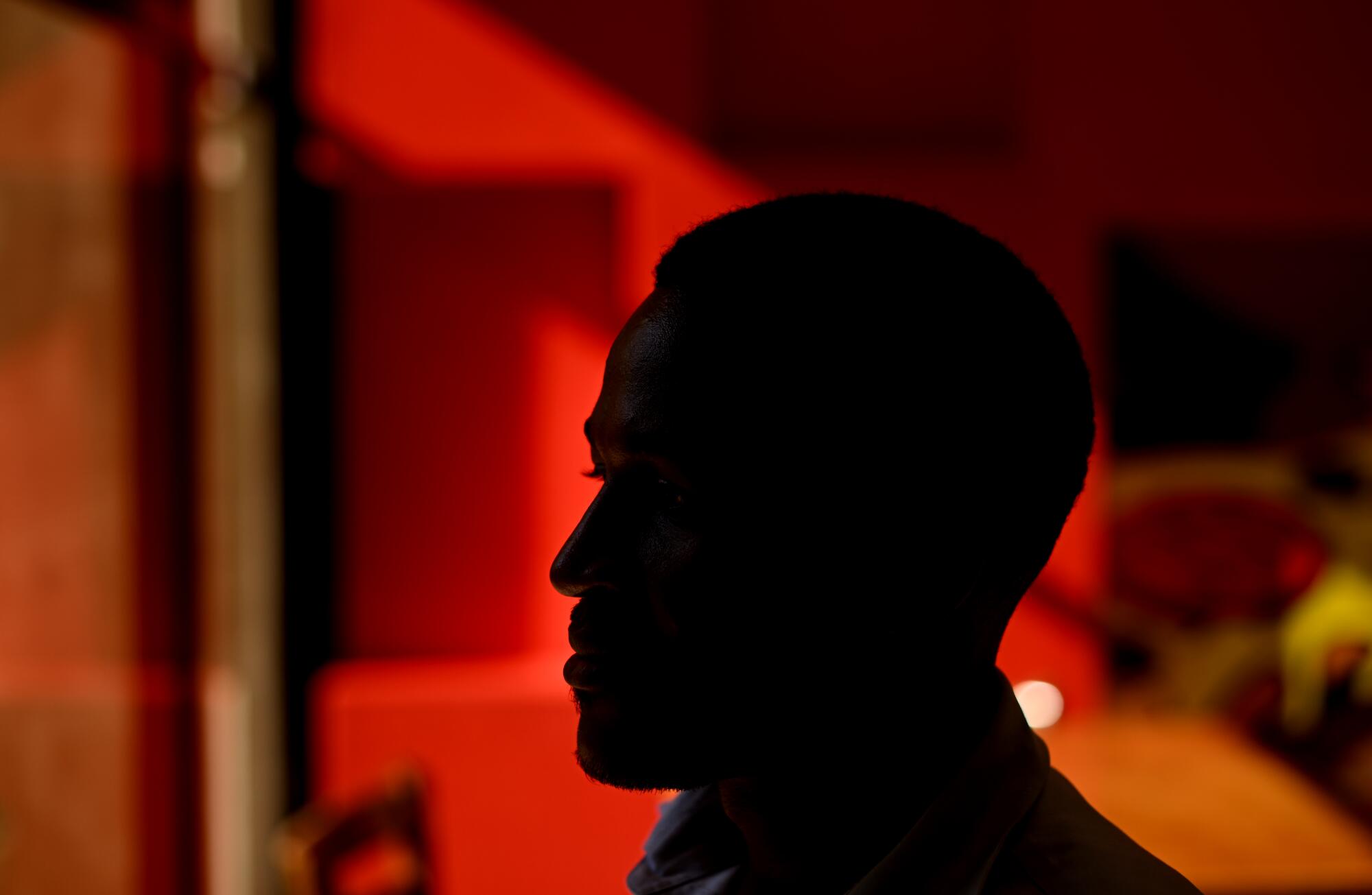
“The social and political momentum had been building,” he said. “Over the past six months or so, there have been a couple of reports about supposedly gay teachers molesting children in school, which has created a kind of a moral panic.” In addition, in early 2023, the Church of England approved same-sex marriage, which made Ugandan Anglican bishops speak out against it and, in February, Muslim leaders organized an anti-gay march. “So, the momentum was there.”
American evangelicals have spent millions in the last several years to push their anti-gay agendas among Christian communities throughout Africa — including Uganda, which is 84% Christian — part of a global cultural war against marriage equality and reproductive rights. Museveni’s wife, Janet, a Cabinet minister and former MP, is among Uganda’s most influential evangelicals.
If the Anti-Homosexuality Bill becomes law, it would make Uganda, a country of 46 million people, the fourth on the African continent where gay people can be put to death; in three others, people convicted of same-sex relations can be imprisoned for life.
In Ghana, where same-sex relationships have long been banned, parliament in 2021 approved draft legislation that would fully criminalize LGBTQ people — not just their actions — and punish any groups supporting that community. The bill remains under parliamentary review and has not been implemented.
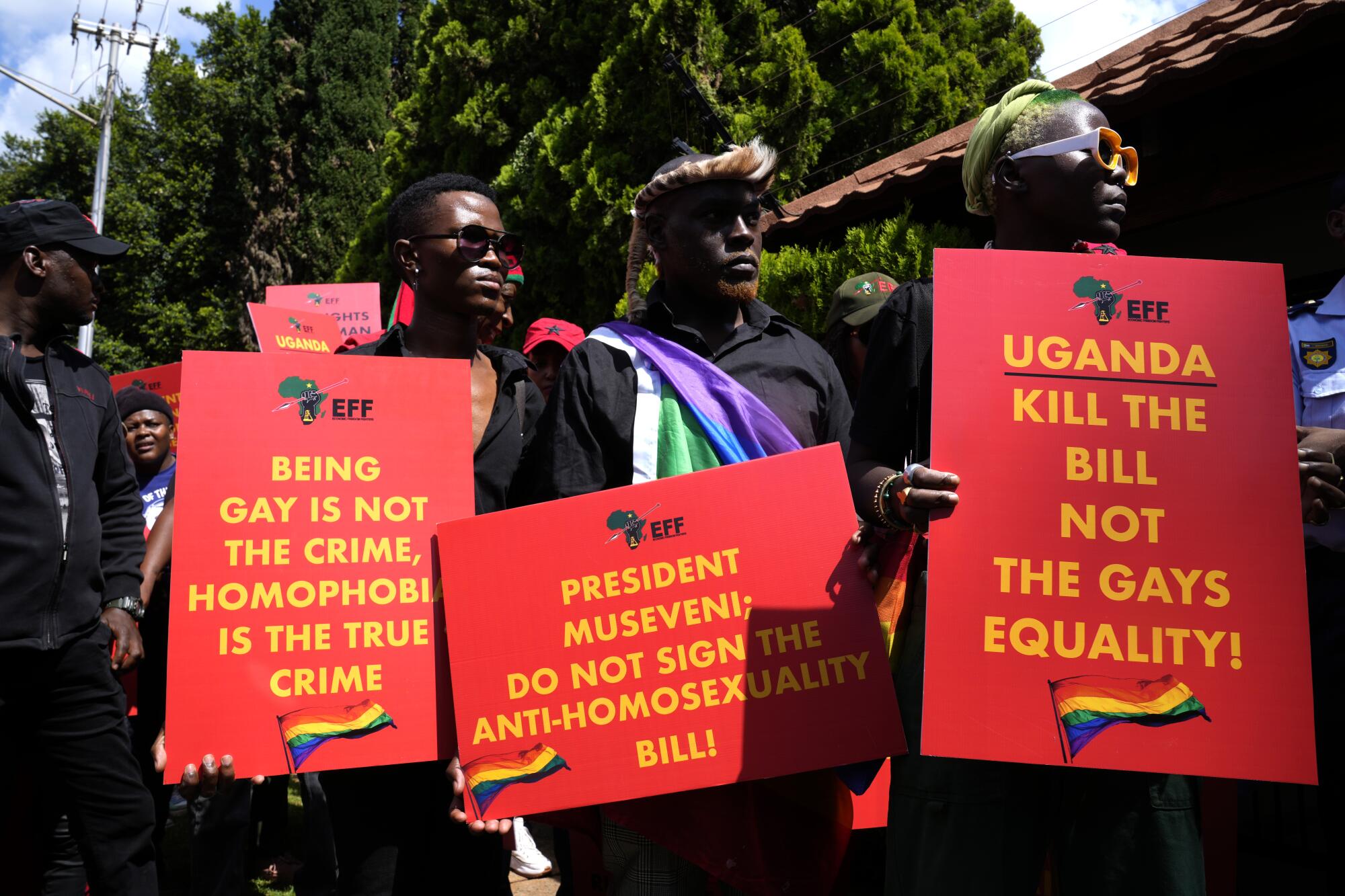
One part of Uganda’s Anti-Homosexuality Bill would make it a crime for landlords and property owners to allow gay sexual acts to take place on their premises. The legislation does not specify how proof would be gathered.
“Do they have a meter that the landlord is supposed to use to gauge if this person is homosexual before they let them in?” the customer service representative asked over tea in an upscale neighborhood of embassies and new high-rise apartment buildings, many of which sat empty. “How do you prosecute someone without evidence? What is going to tell people that you’re gay? Is it because someone is wearing feminine colors?”
In fact, the proposed law doesn’t require evidence of an illegal act, only suspicion of one, to call the police, opening the possibility that personal disputes and workplace quarrels could end with unfounded accusations of being gay.
“It’s almost surreal,” said Joseph, a middle-aged tour organizer who asked that his full name not be used for safety reasons. “People are almost in a panic mode. It’s difficult for people to even think about what happens next.”
::
Joseph, who lives on the edge of Kampala, Uganda’s capital, is a thoughtful, well-read man who has spent his whole life in the deeply conservative country. But he said he’s never seen the kind of anti-gay frenzy that’s taking place now. Last week a magistrate ordered two teachers suspected of promoting lesbianism to be held behind bars, saying he feared for their lives if they were released.
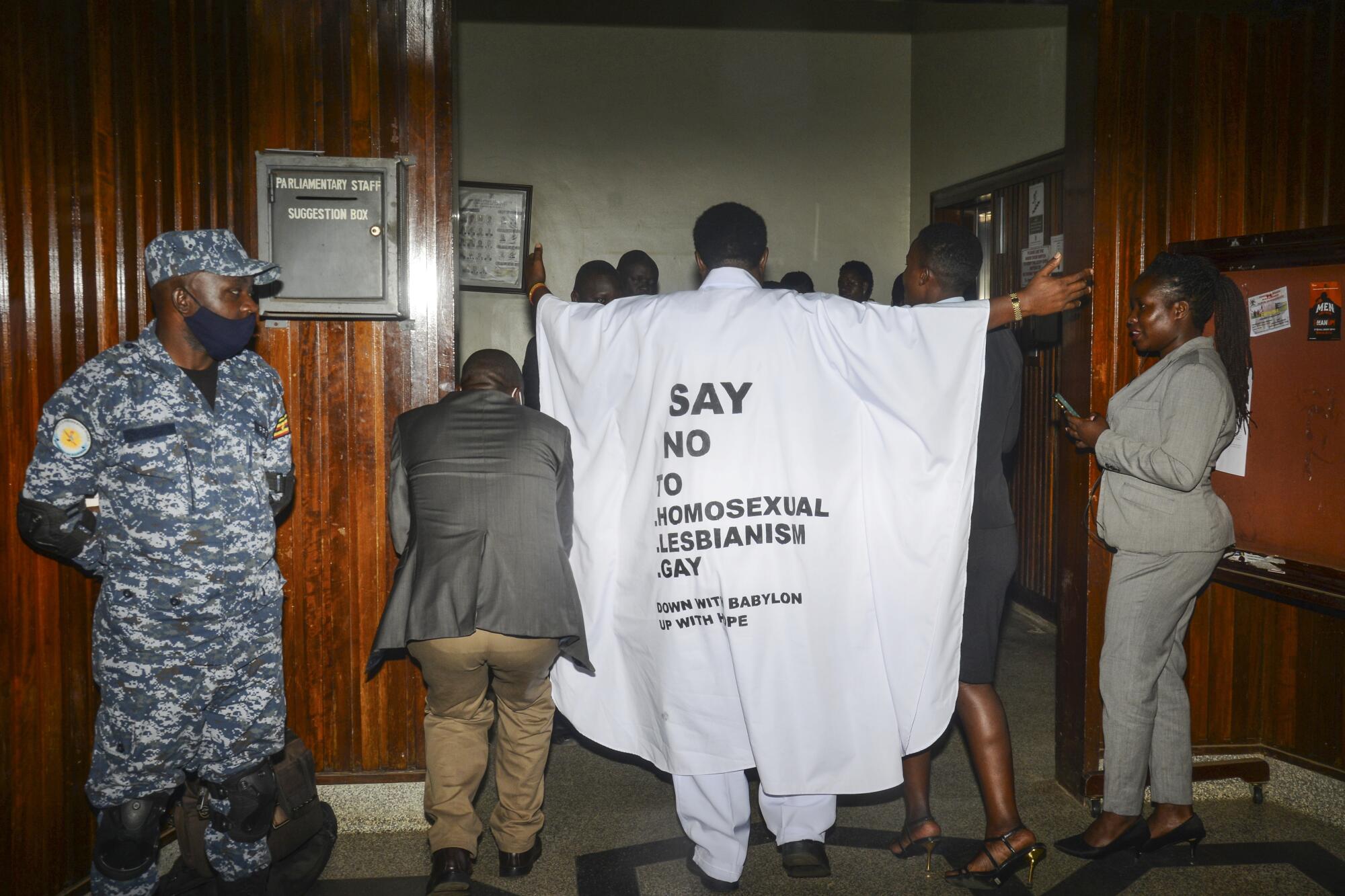
And in a country where the per capita gross income is just $800 a year, Joseph worries many people will be only too willing to turn in their neighbors if the bounty is right.
“The danger is not actually the people, it’s the gay people collaborating with hungry policemen for money,” he said. “People being gay does not mean you can trust them.” If someone could make money via blackmail, he said, they might go ahead with it.
Although the bill hasn’t been signed into law, it is already having an effect, Van Klinken said. Landlords are kicking out tenants they know to be gay. Several LGBTQ organizations, he said, have had their bank accounts frozen.
“If the law is signed, the discrimination will lead to many diverse consequences for my financial, mental and physical well-being,” said a twentysomething insurance company employee who gave his name as Clifford. “The law incites people against each other. ”
Lunching on a sandwich, he added: “You have to be keen to what you’re putting on. Is it something related to the rainbow?”
And what if you leave your cellphone unattended and someone scrolls through the photos?
“You’re fearing for your life,” Clifford continued. “You will be discriminated against.”
Because of that, Clifford, who is college-educated, is among a growing number of LGBTQ people with degrees who are considering leaving Uganda. International investment could also be blunted since companies would run the risk of having their employees jailed — or worse — if they visited Uganda.
“That’s my dream. Go to a place where I can live my life. Because here you have to live being afraid,” Clifford said in a low whisper.
“It’s dangerous. When you’re here, you have to keep shielding yourself.”
Others don’t want to leave – but aren’t sure they can stay, either.
“It’s literally we need to sell our homes. And where do we go?” Joseph said. “We want to be in the jungle, not be shepherded overseas.
“We want to be here.”
More to Read
Sign up for Essential California
The most important California stories and recommendations in your inbox every morning.
You may occasionally receive promotional content from the Los Angeles Times.


